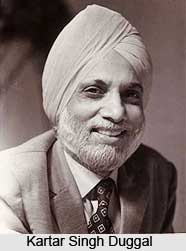 Kartar Singh Duggal, born in 1919, is a brilliant Punjabi writer. He is a master craftsman, who has penned several novels, short stories, plays and poems. He remains unparalleled in Punjabi literature for having fictionalised landmark events in the contemporary history of India. Kartar Singh Duggal`s main contribution to Punjabi theatre lies in radio drama. He retired as director of All India Radio. Through broadcasts and the visual media, his work reached large Hindi-language audiences in far-flung corners of the country. He has published six full-length plays and four collections of shorter drama. All of them were presented very theatrically.
Kartar Singh Duggal, born in 1919, is a brilliant Punjabi writer. He is a master craftsman, who has penned several novels, short stories, plays and poems. He remains unparalleled in Punjabi literature for having fictionalised landmark events in the contemporary history of India. Kartar Singh Duggal`s main contribution to Punjabi theatre lies in radio drama. He retired as director of All India Radio. Through broadcasts and the visual media, his work reached large Hindi-language audiences in far-flung corners of the country. He has published six full-length plays and four collections of shorter drama. All of them were presented very theatrically.
Among his works is the celebrated trilogy covering a volatile period of Punjab, starting with the freedom struggle and ending with the declaration of general elections by Mrs. Indira Gandhi after the Emergency. The first novel is called Haal Mureedan Da i.e. `The Plight of the Devotees`, the second Ab Na Bason Eh Gaon i.e. `No More Will I Live in This Village`, and the last Jal Ki Pyaas Na Jaaye i. e. The Thirst for Water Never Dies.
Mithapani i.e. `Sweet Water` in 1957 is one of the best plays to portray the turmoil that the 1947 Partition entailed on people driven from one part of Punjab and rehabilitated in the other. In Puranian botlan i.e. `Old Bottles` in 1957, the past and present so intersect as to show how the values of both are required for meaningful living. Kohkan i.e. `Mountain-breaker` in 1958 employs the same dramatic strategy efficaciously to show that the present has as much a claim upon the felicity of life as the past is believed to have exercised. Only their domains are different: if it was the personal relationship then, it is the civic life now. Buddham sharanam gachhami i.e. `I Seek the Buddha`s Protection` in 1987 is a long work set in one locale, the Ajanta cave with the painting in which the Buddha attained nirvana. The characters, taken up with the past glory of Buddhism, apprehend its present decline and future extinction. So engrossing do their concerns become that the single scene remains fraught in dramatic terms, however fractured their utterances.
Kartar Singh Duggal has received many honors and awards including the Padma Bhushan, Sahitya Akademi Award, Ghalib Award, Bharatiya Bhasha Parishad Award, Bhai Mohan Singh Vaid Award, and Soviet Land Award.
He has served as Director, All India Radio and Director, National Book Trust. He has also been Advisor of Information, Planning Commission of India. The Library of Congress has approximately 118 of his works.




















